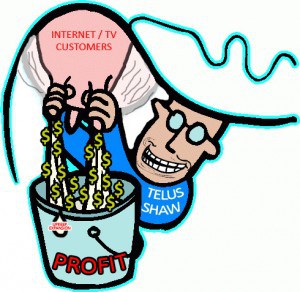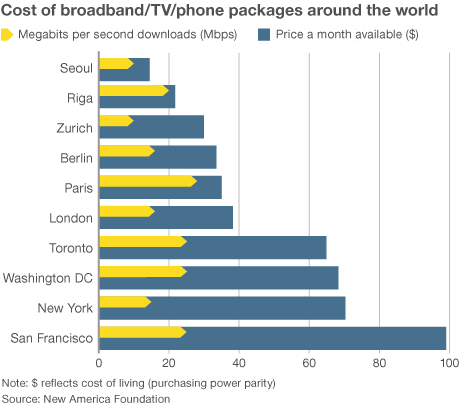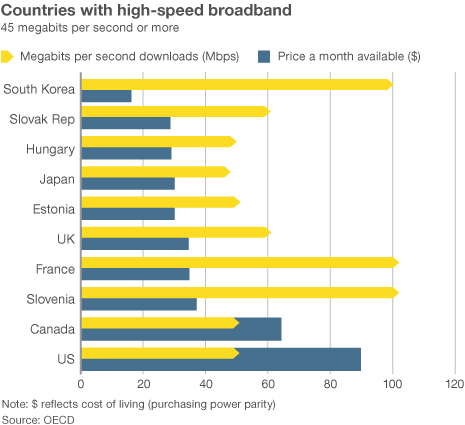
The Plain English Campaign’s Golden Bull Award is given to companies that prefer gobbledygook over plain English.
Comcast is outraged by slanderous suggestions it has data caps on its broadband service.
In response to the scathing report from the Writers Guild of America that pleads for the FCC to block the merger of Comcast and Time Warner Cable, Comcast has accused to WGA of getting its facts wrong and being nothing more than a meddling union.
The WGA writes in their filing with the FCC:
The WGAW has also joined Public Knowledge in asking the FCC to enforce the condition that Comcast not use “caps, tiers, metering, or other usage-based pricing” to treat affiliated network traffic differently from unaffiliated traffic. Comcast has violated this condition by exempting its online video service, Xfinity Streampix, from its own data caps, while the viewing of content by other, unaffiliated video services such as Netflix or YouTube would count against a user’s data cap. The violation of this merger condition is a clear threat to competition from online video distributors, and the FCC should respond by requiring Comcast to stop exempting its Streampix service from data caps.
Comcast pounced on the WGA filing, calling it inaccurate.
 “We don’t have data caps — and haven’t for about two years,” said Sena Fitzmaurice, Comcast’s vice president of government communications. “We have tested data thresholds where very heavy customers can buy more if they want more — but that only affects a very small percentage of our customers in a few markets.”
“We don’t have data caps — and haven’t for about two years,” said Sena Fitzmaurice, Comcast’s vice president of government communications. “We have tested data thresholds where very heavy customers can buy more if they want more — but that only affects a very small percentage of our customers in a few markets.”
Until 2012, Comcast had a uniform usage cap of 250GB a month, above which a customer risked having their broadband service suspended. In 2013, the usage allowances were back, reset at 300GB a month and rolled out to a series of expanding “test markets” that today include Huntsville and Mobile, Ala., Atlanta, Augusta and Savannah, Ga., Central Kentucky, Maine, Jackson, Miss., Knoxville and Memphis, Tenn., and Charleston, S.C.
 Customers who exceed this allowance won’t have their broadband service suspended, they will just get a higher bill, as Comcast charges $10 for each additional 50GB of usage.
Customers who exceed this allowance won’t have their broadband service suspended, they will just get a higher bill, as Comcast charges $10 for each additional 50GB of usage.
In contrast, Time Warner Cable neither has a data cap or a data threshold. Stop the Cap! made sure that didn’t happen when Time Warner attempted to impose its own usage limits back in 2009. We successfully organized protests sufficient to get Time Warner executives to back off and shelve the idea. If Comcast takes over, Time Warner Cable customers will likely eventually face Comcast’s “data thresholds,” which are a distinction without much difference. Whatever you call it, it’s a limit on how much a customer can use Comcast’s already-expensive broadband service before bad things happen.
The WGA and Comcast get along about as well as oil and water, so the back and forth is to be expected. The Writer’s Guild also fiercely opposed Comcast’s merger with NBCUniversal. But when it comes to who is playing fast and loose with the truth, it isn’t the group that writes for a living. Comcast’s doublespeak about data caps is no better than calling The Great Recession a periodic equity retreat. It isn’t fooling anyone.


 Subscribe
Subscribe
 Bigger discounts can be had for television and Internet service — cable television remains immensely profitable in Canada and broadband is cheap to offer, especially in cities. Americans often pay $80 or more for digital cable television packages, Canadians pay an average of $60.
Bigger discounts can be had for television and Internet service — cable television remains immensely profitable in Canada and broadband is cheap to offer, especially in cities. Americans often pay $80 or more for digital cable television packages, Canadians pay an average of $60. Broadband in the United States costs far more than in other countries —
Broadband in the United States costs far more than in other countries —  “Americans pay so much because they don’t have a choice,” said Susan Crawford, a former special assistant to President Barack Obama on science, technology and innovation policy. “We deregulated high-speed Internet access 10 years ago and since then we’ve seen enormous consolidation and monopolies, so left to their own devices, companies that supply Internet access will charge high prices, because they face neither competition nor oversight.”
“Americans pay so much because they don’t have a choice,” said Susan Crawford, a former special assistant to President Barack Obama on science, technology and innovation policy. “We deregulated high-speed Internet access 10 years ago and since then we’ve seen enormous consolidation and monopolies, so left to their own devices, companies that supply Internet access will charge high prices, because they face neither competition nor oversight.”


